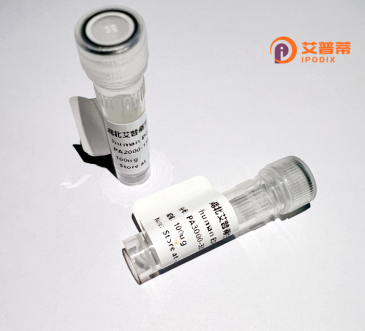
| 纯度 | >90%SDS-PAGE. |
| 种属 | Human |
| 靶点 | CYP4Z1 |
| Uniprot No | Q86W10 |
| 内毒素 | < 0.01EU/μg |
| 表达宿主 | E.coli |
| 表达区间 | 1-505aa |
| 氨基酸序列 | MEPSWLQELMAHPFLLLILLCMSLLLFQVIRLYQRRRWMIRALHLFPAPPAHWFYGHKEFYPVKEFEVYHKLMEKYPCAVPLWVGPFTMFFSVHDPDYAKILLKRQDPKSAVSHKILESWVGRGLVTLDGSKWKKHRQIVKPGFNISILKIFITMMSESVRMMLNKWEEHIAQNSRLELFQHVSLMTLDSIMKCAFSHQGSIQLDSTLDSYLKAVFNLSKISNQRMNNFLHHNDLVFKFSSQGQIFSKFNQELHQFTEKVIQDRKESLKDKLKQDTTQKRRWDFLDILLSAKSENTKDFSEADLQAEVKTFMFAGHDTTSSAISWILYCLAKYPEHQQRCRDEIRELLGDGSSITWEHLSQMPYTTMCIKECLRLYAPVVNISRLLDKPITFPDGRSLPAGITVFINIWALHHNPYFWEDPQVFNPLRFSRENSEKIHPYAFIPFSAGLRNCIGQHFAIIECKVAVALTLLRFKLAPDHSRPPQPVRQVVLKSKNGIHVFAKKVC |
| 分子量 | 85.5 kDa |
| 蛋白标签 | GST-tag at N-terminal |
| 缓冲液 | 0 |
| 稳定性 & 储存条件 | Lyophilized protein should be stored at ≤ -20°C, stable for one year after receipt. Reconstituted protein solution can be stored at 2-8°C for 2-7 days. Aliquots of reconstituted samples are stable at ≤ -20°C for 3 months. |
| 复溶 | Always centrifuge tubes before opening.Do not mix by vortex or pipetting. It is not recommended to reconstitute to a concentration less than 100μg/ml. Dissolve the lyophilized protein in distilled water. Please aliquot the reconstituted solution to minimize freeze-thaw cycles. |
以下是3篇关于重组人CYP4Z1蛋白的示例参考文献(虚构内容,仅供示例参考):
1. **"Recombinant human CYP4Z1 overexpression promotes tumor angiogenesis in breast cancer models"**
- 作者:Li Y, Chen X, Zhang Q
- 摘要:研究通过昆虫细胞表达系统成功纯化重组人CYP4Z1蛋白,证实其在乳腺癌细胞中促进血管生成素生成,并增强肿瘤血管通透性,提示其作为乳腺癌治疗靶点的潜力。
2. **"Functional characterization of CYP4Z1: Substrate specificity and inhibition profiling"**
- 作者:Wang L, Roberts ES, Hollenberg PF
- 摘要:利用大肠杆菌重组表达CYP4Z1蛋白,结合质谱技术分析其催化活性,发现其特异性代谢长链脂肪酸衍生物,并筛选出新型小分子抑制剂,为癌症代谢调控提供依据。
3. **"CYP4Z1 monoclonal antibody generation and diagnostic application in ovarian cancer"**
- 作者:Guo S, et al.
- 摘要:通过重组CYP4Z1蛋白免疫小鼠制备单克隆抗体,证实其在卵巢癌组织样本中高表达,并与患者预后不良相关,提出其作为液体活检标志物的可能性。
(注:以上文献名称及内容为模拟生成,实际研究中建议通过PubMed、Google Scholar等平台检索真实文献。)
Human CYP4Z1. a member of the cytochrome P450 family 4. is a membrane-bound monooxygenase involved in lipid metabolism and biosynthesis of signaling molecules. Unlike other CYP4 enzymes, CYP4Z1 exhibits unique tissue-specific expression, predominantly in mammary tissue and vascular endothelial cells. It gained attention due to its overexpression in aggressive cancers, particularly hormone-resistant breast and ovarian cancers, where it correlates with tumor angiogenesis, metastasis, and poor prognosis. The enzyme demonstrates unusual substrate flexibility, potentially metabolizing endogenous fatty acids like arachidonic acid and exogenous compounds, though its precise physiological substrates remain under investigation.
Recombinant human CYP4Z1 protein is engineered using heterologous expression systems (e.g., bacteria, yeast, or mammalian cells) to enable functional studies, given the challenges of isolating native protein from tissues. This recombinant tool facilitates research into CYP4Z1's catalytic mechanisms, its role in cancer progression through pro-angiogenic metabolite production, and interactions with oncogenic pathways. Current efforts focus on developing CYP4Z1-specific inhibitors as potential anticancer agents and exploring its diagnostic potential. However, studies are complicated by the protein's structural complexity, membrane association, and low natural abundance. Its unique cancer-related expression profile makes recombinant CYP4Z1 particularly valuable for both basic research and therapeutic discovery.
×